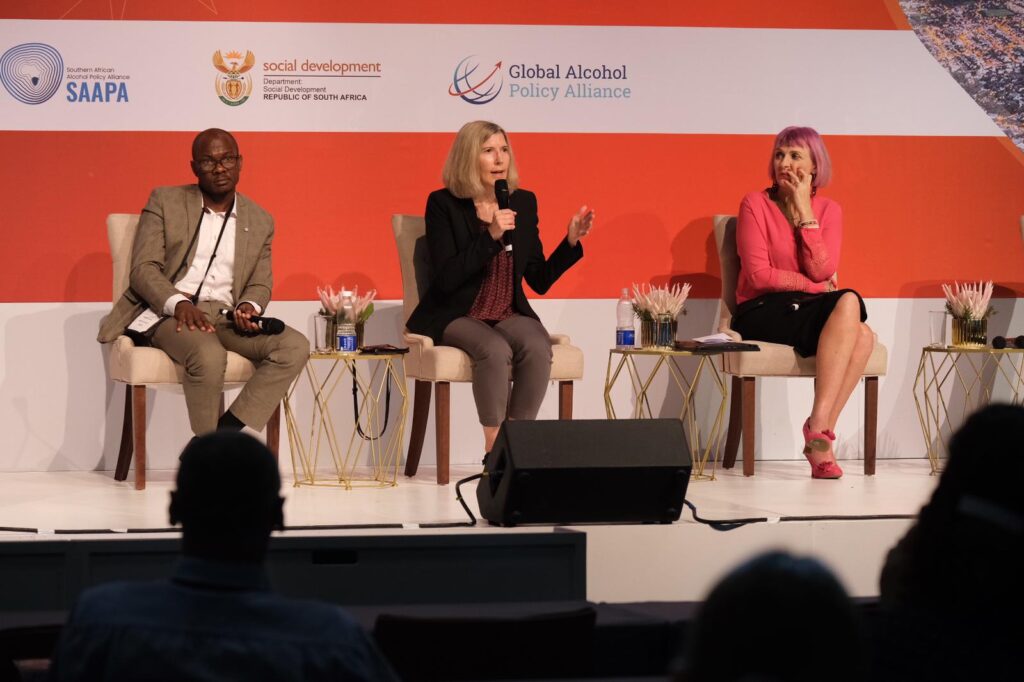
In the heart of Cape Town, South Africa, the 7th Global Alcohol Policy Conference convened experts and advocates from around the world in October 2023. Among them, the RESET Alcohol initiative stood out as a beacon of strength and action toward tackling alcohol-related harm.
A Vision for Change
RESET’s core mission is bold and groundbreaking: to reduce alcohol harms through proven policies in six key countries—Mexico, Colombia, Sri Lanka, Philippines, Brazil, and Kenya. Funded by Open Philanthropy and led by Vital Strategies, RESET is a consortium with Johns Hopkins University (Tobacconomics team), Movendi International, Global Alcohol Policy Alliance, NCD Alliance, and the World Health Organization, and is in alignment with WHO’s SAFER strategy—a package of proven interventions to reduce the harms caused by alcohol.
RESET is focused on three of SAFER’s most effective policy interventions: increasing alcohol taxation, reducing alcohol marketing and restricting availability. These policies are aimed at saving lives and reshaping the alcohol landscape.
A Conference Aligned in Mission and Method
The Global Alcohol Policy Conference agenda resonated deeply with RESET’s goal and objectives. This year’s focus was on promoting science-based policies free from commercial interests, with a particular emphasis on taxation, digital alcohol marketing regulation, and reducing industry influence.
In a plenary session entitled “New Initiatives in Promoting Impactful Policies and Reducing Industry Influence,” Jacqui Drope, Director of the RESET Initiative, described how RESET is leading the charge to reduce alcohol harms, showcasing how the initiative is navigating the complex landscape of alcohol policy to leverage strengths, confront challenges and build collaborative approaches.
Shedding light on the hurdles—among them data gaps, the absence of a standard for effective tax increases, and the pervasive influence of the alcohol industry—Drope also talked about opportunities: the untapped potential of adopting successful policies that have driven tobacco control wins for decades, and more recently, food policy wins aimed at reducing consumption of sugar-sweetened beverages and ultra-processed foods.
One of the highlights of the conference was the WHO SAFER and RESET Alcohol knowledge and practices exchange session. Here, the RESET partners shared their progress building evidence for tax increases through high-impact partnerships with local organizations.
Another session featured representatives from RESET’s six countries, who presented on their alcohol taxation work. Each country’s story was unique, yet all shared a common thread: the pursuit of effective alcohol tax policies to improve public health. From Sri Lanka’s advocacy efforts, to Brazil’s implementation strategies, to the Philippines’ case for tax increases and Kenya’s analysis of household spending patterns affected by alcohol expenditure, the session painted a vivid picture of diverse approaches and shared challenges.
A Road Map for a Healthier Future
The key message emerging from the conference, and one that RESET embodies, is the unyielding commitment to public health and support for nations striving to protect their citizens from alcohol-related harm.
By sharing their expertise and learning from others, RESET partners at the Global Alcohol Policy Conference demonstrated their leadership in global alcohol policy by offering practical, evidence-based solutions and a road map for others to follow. They showed that through policy we can help people and communities reduce alcohol harms and contribute to a healthier future for all.
RESET Alcohol is an initiative that brings together national governments, civil society, research organizations, and global leaders in public health and alcohol policy to develop and implement evidence-based alcohol policies from the World Health Organization’s SAFER technical package. RESET’s primary policy focus is increasing alcohol taxation, one of the most effective interventions for reducing consumption. In addition, governments are encouraged to complement their alcohol tax increases by reducing alcohol marketing and availability.